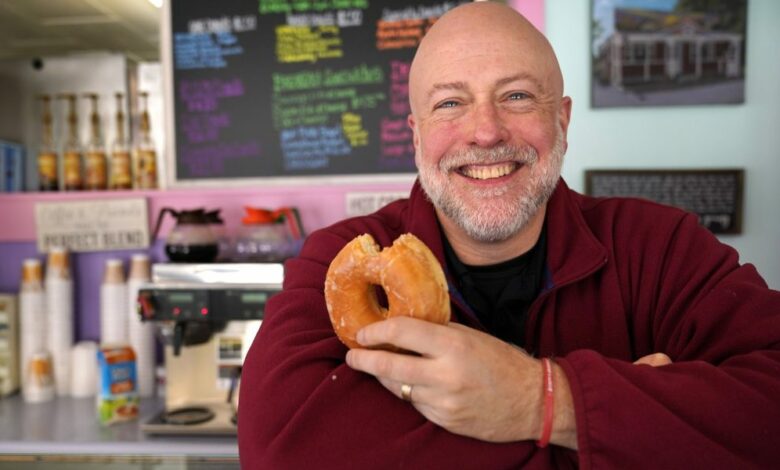New Hampshire donut censorship and the ‘speech police’: Local bakery sues over ruling that student-painted mural was advertising, not art


A New Hampshire town’s new ordinance that was pitched as “a path forward” for public artwork hasn’t resolved a bakery owner’s First Amendment dispute over a large pastry painting, and his lawyer predicts it will only lead to more litigation as town officials become “speech police.”
Conway residents passed the ordinance by a vote of 1,277 to 423 during town elections Tuesday, part of a lengthy ballot for budget and spending items and picking government positions, such as selectboard, treasurer, and police commissioner.
The vote came more than a year after the owner of Leavitt’s Country Bakery sued the town over a painting by high school students that’s displayed across his storefront, showing the sun shining over a mountain range made of sprinkle-covered chocolate and strawberry doughnuts, a blueberry muffin, a cinnamon roll and other pastries.
The zoning board decided that the painting was not so much art as advertising, and so could not remain as is because of its size. At about 90 square feet (8.6 square meters), it’s four times bigger than the town’s sign code allows.
The new ordinance requires applicants to meet criteria for art on public and commercial property. It says that while the zoning and planning boards must approve the appropriateness of theme, location, and design before the selectboard considers each proposal, the process should make “no intrusion into the artistic expression or the content of work.”
“There’s no part of writing that where we try to limit any kind of speech,” Planning Board Chairperson Benjamin Colbath said at a March 28 meeting. “We did try to carefully write that and certainly took inspiration from what a lot of other communities are doing as well, as well as confirm with counsel on that one.”
A lawyer for the bakery had urged voters to reject the ordinance.
“Typically, people get to decide whether to speak or not; they don’t have to ask the government ‘pretty please’ first,” Robert Frommer wrote last week in the Conway Daily Sun.
“All commercial property owners would have to get permission before putting up any sort of public art in town,” Frommer wrote, and town officials can “deny murals because of what they depict, or who put them up.”
Sean Young, the bakery owner, said he was voting NO: “Local officials don’t get to play art critic.”
Young sued after town officials told him the painting could stay if it showed actual mountains — instead of pastries suggesting mountains — or if the building wasn’t a bakery.
Young’s lawsuit was paused last year as residents considered revising how the town defines signs, in a way that would have allowed the sign to stay up. But that measure was seen as too broad and complex, and it failed to pass.
The mural remains in place for now, as his case heads to trial this November.
Frommer told The Associated Press in an email that the town hasn’t said whether the new ordinance will impact Leavitt’s mural, “and if Sean wanted to paint a different mural with the high school students at any of his businesses, he would have to jump through the ordinance’s unconstitutional hoops.”
The town’s attorney didn’t immediately respond to an emailed request for comment on Wednesday.
When Colbath discussed the ordinance at last month’s meeting, he painted it as a way to facilitate more public art in town.
“There was a hole in our ordinance and I wanted to try to make it clear and an easier path forward for community art,” he said.
Source link




